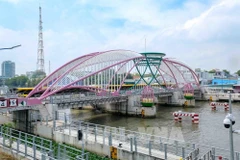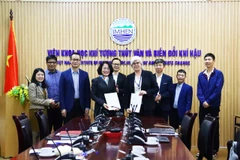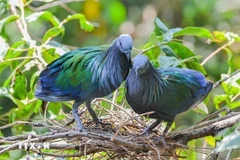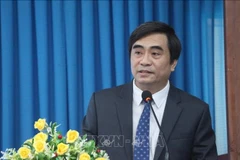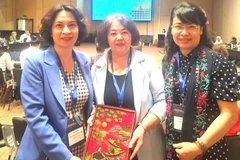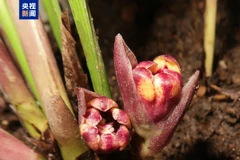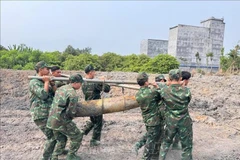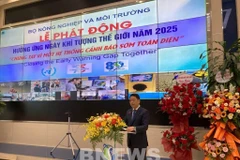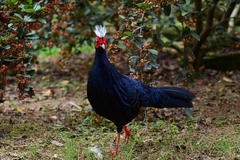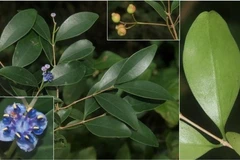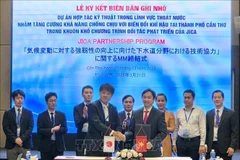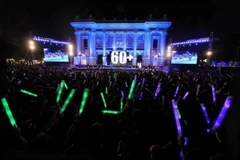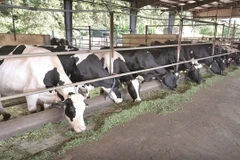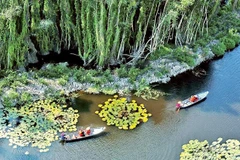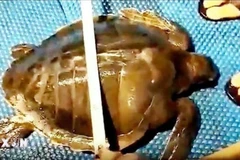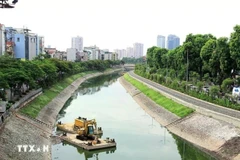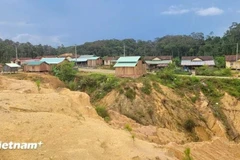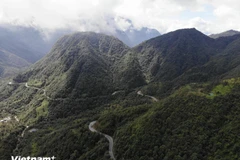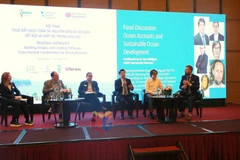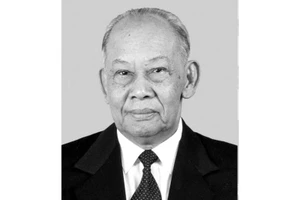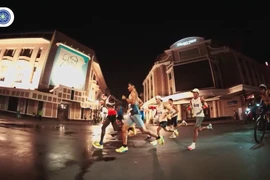HCM City (VNS/VNA) -More companies in Vietnam are carrying out programmes to reducewaste and achieve sustainable,environmentally-friendly operations.
The campaign “Go Green”from TikiNOW Smart Logistics, for example, has contributed to sustainableand eco-friendly operations after one year of implementation.
In September last year,TikiNOW Smart Logistics (TNSL), Tiki’s logistics entity, kicked off “GoGreen", which focuses on two key approaches: replacementand reduction.
The first step is to replacenon-compostable plastic packaging materials with eco-friendly ones with a muchshorter decomposition time. Specifically, bubble wraps, commonly usedto protect fragile items but need 100 years to completelydecompose, are now replaced with carton papers, which need only two monthsfor decomposition.
Foams that hold products inplace and take as long as one million years to decompose are replaced withthick papers. Bulky goods are covered with 2 to 3 layers of protectivepapers and with biodegradable plastic wraps to help minimise damages fromimpacts during transportation.
Together with replacement,reduction is also applied as another major approach in TNSL’s green operationschain.
Before the campaign began,there were 16 kinds of packaging boxes with different sizes at Tikiwarehouses. The box sizes, however, did not fit the items’ actual sizes.This resulted in items being packed in much larger boxes, whichrequired extra amounts of material such as foam orplastic during transportation.
Henry Low, CEO of TNSL, said:“This not only requires much more packaging material than actualdemand, but also causes excess air in transportation, which leads toneither environmentally friendly nor efficient operations.”
Since the "Go Green"campaign was launched, TNSL has optimised packaging box sizes at allfulfilment centres. All products before being warehoused are scanned forsize measurement and storage by Cubiscan machines.
When packing, warehouse workersscan the code of a single product or of all the products in one order, andthe system recommends the most suitable box size. This not only cuts downpackaging time but also saves a large portion of other extra materials.The size and weight of transport are also better optimized.
The number of box sizes atTNSL warehouses has been reduced to nine types. And 85 per centof packaging materials at TNSL are now eco-friendly. The proportion ofpackaging materials in use has also halved, which has led to a decline incost of 50 per cent.
In order to accomplish theseresults and progress to further improvement in the coming time, commitment byall staff and management is essential. Human resourcetraining is considered a key factor in the success of the campaign.Personnel at the TNSL Fulfillment Center are equipped with knowledgeabout limiting plastic waste and practical skills thatalign with the new packaging standards.
Low said: "Conducting thiscampaign is not about catching temporary trends, but is about our long-termstrategy in building and developing a sustainable and responsible supplychain.”
Another company pursuing wastereduction is Coca-Cola Beverages Vietnam Limited, which wants to have allof its packaging to be recyclable by 2025, and to have at least 50per cent recycled material used in its packaging by 2030.
The company has also launched aprogramme to remove plastic shrink film on Dasani bottled water, and aimsto collect and recycle a bottle or can for each one sold by 2030.
The company said these actionsreflect its commitment to its long-term strategy for managingplastic waste, as part of Coca-Cola’s global strategy called “WorldWithout Waste”.
Coca-Cola isco-operating with the Vietnam Business Council for SustainableDevelopment, Vietnam Chamber of Commerce & Industry, Unilever and Dow tocarry out a "Zero Waste to Nature" programme which promotes acircular economy and raises public awareness, seeks effective recyclingtechnology, and builds new habits of responsible waste management in society.
Coca-Cola Vietnam is one of thefounding members of the Packaging Recycling Organisation Vietnam (PRO Vietnam),which shares their goals, vision and responsibilities in promoting acircular economy in Vietnam through activities of reducing, sorting, collectingand recycling waste.
PRO Vietnam
PRO Vietnam is a coalition ofleading FDI and Vietnamese companies with high prestige, diverseexperiences and especially an earnest responsibility to Vietnameseconsumers and to the environment. This includes the consumer goods andpackaging industries, united in a vision to work with the Governmentin providing a long-term impetus to packaging and recycling in thecountry, making Vietnam green, clean and beautiful.
According to PRO Vietnam, rapidurbanisation and consumerism combined with the lack of ananti-litter culture and absence of recycling mindset among the population isbuilding up to a large-scale litter and ecologicalproblem in Vietnam.
Most of Vietnam’s mismanagedpackaging waste is ending up in landfills and spoiling the country’s longcoastline, according to PRO Vietnam.
Vietnam ranks amongthe top four countries with the largest volume of mismanaged plasticwaste in the world. A huge portion of inorganic waste in Vietnam ispackaging, which does not get treated properly.
PRO Vietnamis supporting the Government in the “Recycle” aspect of the3Rs (Reduce – Reuse – Recycle).
The focus of PRO Vietnamis to build partnerships between local governments andstakeholders in the value chain for packaging in order to increaserecycling.
PRO Vietnam is focused onincentivising the recycling industry to increase packaging collections via theinformal and formal sectors, in addition to education and awareness to drivebehaviour change by promoting the circular economy for packaging.
PRO Vietnam aims to collaboratewith the recycling business, driving a circular economy of packaging in Vietnamby 2030. This model will recreate an entire ecosystem of consumer goodpackages, from design and manufacture to collection after usage,recycling and reuse, giving a second life to packaging waste.
URC, a leading food andbeverage manufacturer in Vietnam, was a founding member of PRO Vietnam. Aspart of the group's strategy outlined last year, it wants PROVietnam to contribute to a green, clean and beautiful Vietnam by promotinga circular economy model through the product packaging and recycling process.
Laurent Levan, president andgeneral director of URC Vietnam, said on the Pro Vietnam website: “Weunderstand that packaging can bring convenience as well as guarantee foodhygiene, but it also creates a burden of waste if not handled properly."
Acknowledging itsresponsibility in the plastic waste crisis, Levan said that PRO Vietnam"wants to join hands with the community to become part of thesolution".
Maintaining sustainabledevelopment and accompanying the community to adapt to climate changeand prevent pollution are not only thecompany's responsibility to society,but also offer competitive advantages that help URC build aresilient value chain and closer relationships with consumers, the companysaid./.




